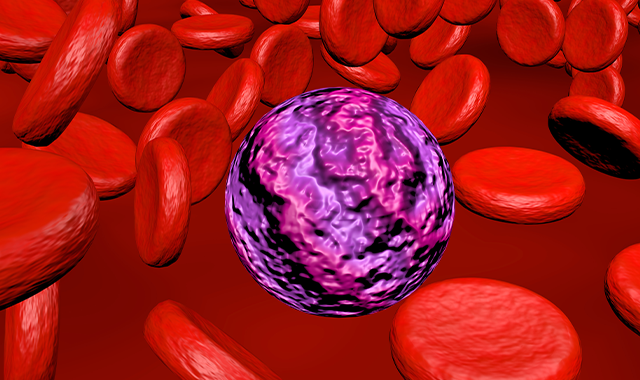Apixaban Yields No Significant Benefit in Acute Lymphoblastic Leukemia
Safety data from the phase 3 PREVAPIX-ALL trial support the use of apixaban among pediatric patients with acute lymphoblastic leukemia who are at high risk of thrombosis.
"...For patients deemed to be at particularly high risk of thrombosis, PREVAPIX-ALL [NCT02369653] provides encouraging safety data for the use of apixaban in clinical settings in which the potential benefits are thought to outweigh the risk of bleeding," according to the study authors.

Treatment with apixaban (Eliquis) produced no statistically significant treatment benefits among pediatric patients with acute lymphoblastic leukemia (ALL) or lymphoma compared with those who received no systemic anticoagulation agent, according to findings from the phase 3 PREVAPIX-ALL trial (NCT02369653) published in Lancet Haematology.
Overall, 12% of patients treated with apixaban had a composite venous thromboembolism compared with 18% of those in the standard-of-care arm (relative risk [RR], 0.69; 95% CI, 0.45-1.05; P = .080). Additionally, investigators reported a non-fatal clinically unsuspected deep venous thrombosis in 11% and 15% of patients in each respective arm (RR, 0.71; 0.45-1.13; P = .14); the corresponding rates for non-fatal symptomatic deep venous thrombosis were 2% and 2% (RR, 0.67; 95% CI, 0.19-2.23; P = .52).
Investigators highlighted major or clinically relevant non-major bleeding in 5% of patients who received apixaban vs 2% of those treated with standard of care (RR, 2.60; 95% CI, 0.94-7.17; P = .055). Major bleeding also occurred in 1% and 1% of patients in each respective arm (RR, 1.00; 95% CI, 0.14-7.01; P = 1.0). Additionally, the rates of clinically relevant non-major bleeding in each respective arm were 4% and 1% (RR, 3.67; 95% CI, 1.04-12.97; P = .030), and the rates of minor bleeding were 14% and 8% (RR, 1.85; 95% CI, 1.10-3.10; P = .017).
“The results of [the] PREVAPIX-ALL [trial] do not support uniform use of pharmacological thromboprophylaxis in pediatric patients with [ALL] or lymphoma, and the safety of apixaban during induction chemotherapy requires continued study in patient subsets such as children younger than 2 years, those with central nervous system disease, and those with hyperleukocytosis,” the study authors wrote. “However, for patients deemed to be at particularly high risk of thrombosis, [the] PREVAPIX-ALL [trial] provides encouraging safety data for the use of apixaban in clinical settings in which the potential benefits are thought to outweigh the risk of bleeding.”
In the open-label PREVAPIX-ALL trial, 512 patients were randomly assigned 1:1 to receive weight-adjusted apixaban administered twice a day (n = 256) or standard-of-care therapy without systemic anticoagulation (n = 245).
The trial’s primary efficacy end point was symptomatic or clinically unsuspected venous thromboembolism, and the primary safety end point was major bleeding. Secondary safety end points included the composite of major and clinically relevant non-major bleeding.
Patients 1 year or older but younger than 18 years with newly diagnosed ALL or lymphoblastic lymphoma and a new central venous line inserted between a week before and 4 days following induction were eligible for enrollment on the trial. Those who received a corticosteroid, vincristine, and asparaginase with or without an anthracycline were also able to enroll on the trial.
The median age was 6 years (interquartile range [IQR], 4-11) in the apixaban group and 6 years (IQR, 3-11) in the standard-of-care arm. Most patients in each respective arm were male (55% vs 58%), White (76% vs 76%), had B-cell disease (88% vs 88%), and standard-risk ALL (66% vs 67%).
Investigators highlighted adverse effects (AEs) in 91% of patients who received apixaban compared with 84% of those who received standard of care alone. Common grade 3 to 5 AEs in each respective arm included anemia, thrombocytopenia or platelet count decreases, and febrile neutropenia, which were expected during ALL induction therapy.
One patient in the apixaban group died due to coagulopathy and hemorrhage following cardiac arrest of unknown cause. Additionally, 3 patients who received standard-of-care therapy died due to infection (n = 1), intracranial hemorrhage (n = 1), and cardiac arrest (n = 1) in the treatment-emergent period, and another died due to an infection reported during another point in the study.
Reference
O’Brien SH, Rodriguez V, Lew G, et al. Apixaban versus no anticoagulation for the prevention of venous thromboembolism in children with newly diagnosed acute lymphoblastic leukaemia or lymphoma (PREVAPIX- ALL): a phase 3, open-label, randomised, controlled trial. Lancet Haematol. Published online November 16, 2023. doi:10.1016/S2352-3026(23)00314-9